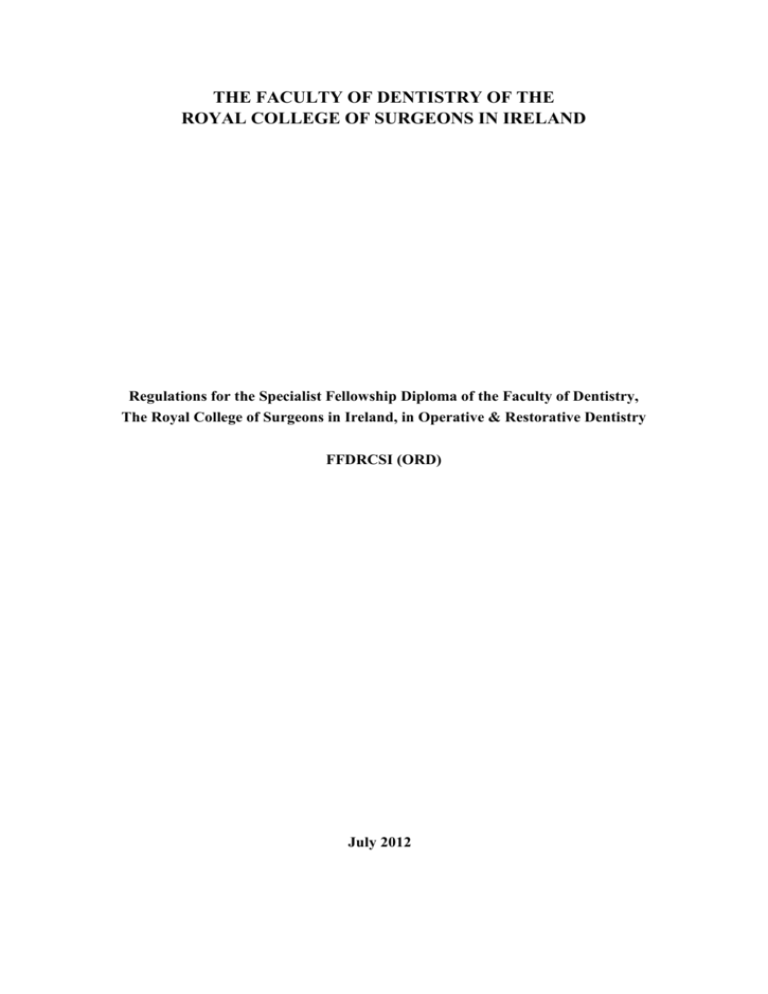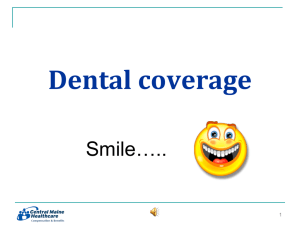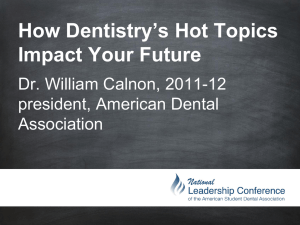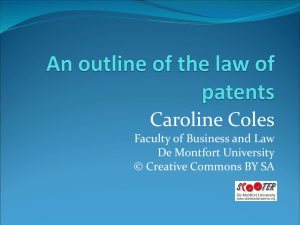the examination - Faculty Of Dentistry
advertisement

THE FACULTY OF DENTISTRY OF THE ROYAL COLLEGE OF SURGEONS IN IRELAND Regulations for the Specialist Fellowship Diploma of the Faculty of Dentistry, The Royal College of Surgeons in Ireland, in Operative & Restorative Dentistry FFDRCSI (ORD) July 2012 INTRODUCTION This booklet contains the Regulations relating to the Specialist Fellowship Diploma of the Faculty of Dentistry of the Royal College of Surgeons in Ireland, in Operative & Restorative Dentistry, FFDRCSI (ORD) Faculty of Dentistry Royal College of Surgeons in Ireland, 123 St. Stephen's Green, Dublin 2, Ireland. Phone: Fax: Email: Website: +353-1-4022239 +353-1-4022125 facdentistry@rcsi.ie http://dentistry.rcsi.ie GENERAL REGULATIONS 1. The Specialist Fellowship Diploma of the Faculty of Dentistry, Royal College of Surgeons in Ireland, in Operative & Restorative Dentistry - FFDRCSI (ORD) - may be granted to those who possess a dental qualification and are graduates or diplomates in Dental Science of those universities and other licensing bodies recognised for the purpose (i.e. those that admit candidates to Temporary Registration in Ireland and UK) and who comply with the Regulations. 2. The requirements to present for the examination in the Specialist Fellowship, FFDRCSI (ORD) are: a. FDS, MFD/MFDS or equivalent. Candidates unable to offer these qualifications will have to show evidence of passing a written postgraduate examination in basic dental sciences. b. Evidence of satisfactory completion of three years full-time (or parttime equivalent not normally exceeding six years) recognised training in Operative & Restorative Dentistry in an institution or hospital acceptable to the Faculty. Candidates are required to submit certified, documented evidence of their training along with the estimated date of completion of training. 3. The dates of the examination and the fees payable for admission to the examination are set out in the examination calendars, which are published annually by the College and are available on the Faculty of Dentistry website. [www.rcsi.ie].The examination is conducted in the English language. 4. Applications must be addressed to the Education Committee of the Faculty of Dentistry, Royal College of Surgeons in Ireland and must be accompanied by certificates showing the date and place of obtaining a dental qualification (as per paragraph 1) and particulars of subsequent experience (as per paragraph 2). Training supervisors by signing the application form are verifying that the candidate has satisfactorily completed the required training and is, to the best of their knowledge, eligible to sit the examination. The final arbiter of eligibility to sit the examination is the Board of the Faculty of Dentistry, Royal College of Surgeons in Ireland. 5. Every candidate shall give notice of intention to present him/herself for examination no later than the closing date as indicated on the examination calendar. 6. The required certificates and the full amount of the fee payable for the examination must accompany applications for admission to an examination. 7. Candidates withdrawing from an examination must do so in writing before the closing date. The entrance fee will be returned less a 20% administrative charge. Candidates who withdraw from the examination after the closing date or who fail to attend the examination for which they have been accepted will not normally be entitled to any refund of the fee. Refusal of the employing authority to allow leave to attend the examination will not be accepted as qualifying for any refund after the closing date. A refund on medical grounds, even if there is a medical certificate, is not normally allowed. Applications for consideration on medical or compassionate grounds must be supported by the Consultant or Dean responsible for training and must be submitted to the College with any accompanying evidence within 28 days of commencement of the examination. 8. The College may refuse to admit to the examination (or to proceed with the examination of) any candidate who infringes any of the regulations or who is considered by the examiners to be guilty of behaviour prejudicial to the proper management and conduct of any examination. 9. Candidates who desire to make representation with regard to the conduct of the examination must address them to the Examinations Office of the Royal College of Surgeons in Ireland within 1 month of the examination and not in any circumstances to an examiner. Representation will then be dealt with according to the policy agreed by the College. 10. Candidates who consider that their experience is equivalent to the training set out above, but who do not comply exactly with these rules, may apply for special consideration by submitting full details in writing at least three months before the closing date of the examination to the Education Committee, Faculty of Dentistry, Royal College of Surgeons in Ireland. A final decision will rest with the Board of the Faculty of Dentistry (as per paragraph 4). THE EXAMINATION 11. The FFD RCSI (Operative & Restorative Dentistry) Specialist Fellowship Diploma examination will test the candidate's understanding of diagnosis and treatment planning over a wide range of problems in Restorative Dentistry together with his/her expertise in carrying out restorative treatment. The candidate will be examined in all of the following disciplines within Restorative Dentistry: Operative Dentistry/Endodontics Periodontics [including implant dentistry] Prosthodontics [Fixed & Removable] The examination consists of the following components: a. A three hour written paper with three compulsory questions [one from each of the disciplines within Restorative Dentistry (a choice of 2 questions from each section)]. b. A one and a half hour multiple short answer paper to be answered in general Restorative Dentistry. c. OSCE A 2 hour O.S.C.E. [8 x 15 minutes stations]. 5 of the stations will be core stations in general Restorative Dentistry and 3 will relate to each of the specific disciplines within Restorative Dentistry as above. d. A 30 minute oral examination. e. A 45 minute case presentation section For Operative Dentistry/Endodontics A 14 minute presentation of the case records of 1 patient treated personally by the candidate. The case history should describe the examination, diagnosis, treatment planning and management of a patient who has received general restorative care of an advanced nature [including Operative Dentistry/Endodontics]. For Periodontics A 14 minute presentation of the case records of 1 patient treated personally by the candidate. The case history should describe the examination, diagnosis, treatment planning and management of a patient who has received general restorative care of an advanced nature including Periodontics. For Prosthodontics A 14 minute presentation of the case records of 1 patient treated personally by the candidate. The case history should describe the examination, diagnosis, treatment planning and management of a patient who has received general restorative care of an advanced nature including Prosthodontics. Suitable presentations could include: 1. 2. An edentulous case with or without implants A removable partially dentate case (e.g. which might include an overdenture component) 3. A fixed restorative case on natural teeth with or without implants (minimum of 4 units) Each of the fully documented case histories should be typed and separately bound (not more than 1000 words per case). A robust, flat type A4 format with clear PVC pockets is recommended. Duplicate copies of each case history are required (no photocopies), one copy being submitted to the College at the time of making the application for the examination, the other being retained by the candidate for reference. Radiographs, photographs or digital prints of these (transparencies will not be accepted) and any other presentation aids should be provided where appropriate and these should be clearly described in the text. The originals should form part of the case history retained by the candidate. Study casts should be brought by the candidate on the day of the Examination and articulated as is considered appropriate. Each of the fully documented case histories and associated illustrative material (e.g. radiographs, study casts, etc.) should be identifiable using coloured adhesive labels as follows: Operative Dentistry/Endodontics: Case 1 History Periodontics: Case 2 History Prosthodontics: Case 3 History Red Blue Green The candidate's name or initials must not be shown on the material. Only the patient's initials, gender and date of birth should be shown. The addresses of the candidate and the patients should not be indicated. Each fully documented case history should give a brief description of the relevant history and results following clinical examination and investigations adopted. The candidate should also give his/her assessment of the diagnostic features and discuss the treatment plan advised. Emphasis should be placed on the careful and complete assessment of the patient's needs in the light of all relevant circumstances. The candidate should refer to any further investigations and/or treatment which may be required and comment on any special difficulties which necessitated a modification of the initial treatment plan. Each case history should end with an appraisal of the outcome of the treatment together with a discussion of whether the objectives were fully achieved. The case histories should be accompanied by a signed statement from the clinician responsible for the direct supervision of the candidate, confirming the candidate's management of the submitted cases. This statement should be separately addressed to the Education Committee in a sealed envelope. It must not be enclosed with the clinical case histories. The clinical case histories will be available for collection following the adjudication and candidates should note that this is their personal responsibility. RECOGNISED HOSPITALS /TRAINING INSTITUTIONS 12. The clinical appointments required by Regulations may be held at the following institutions: (a) Hospitals or institutions which have been recognised for training in relevant specialities by the Surgical Royal Colleges of Ireland and UK. (b) In relation to hospitals or institutions not covered in Sections (a), candidates may submit their record of experience in detail to the Education Committee of the Faculty of Dentistry for consideration. SYLLABUS The General Restorative Dentistry element of the examination will test the candidates broad based understanding of the theory and practice of Restorative Dentistry set in the context of total patient care. The relevant basic and clinical science will be included. The specialist element of the examination will follow from this broad base. No syllabus can be comprehensive and the lists which follow are not intended to be prescriptive or exhaustive. Candidates are expected to be aware of recent developments in their specialist field. The level of understanding of the following subjects should be appropriate to a three year specialist training programme. OPERATIVE DENTISTRY/ENDODONTICS - Anatomy, physiology and pathology of the masticatory system and related structures, including teeth and periodontium. Microbiology of dental plaque, caries and periodontal disease Aetiology and diagnosis of dental caries - Therapeutic and operative management of dental caries Aetiology and diagnosis of tooth wear Operative management of tooth wear Cell biology Comprehensive diagnosis and treatment planning Prevention of dental disease Sedation, local and general anaesthesia Radiology and imaging - Pharmacology and therapeutics - Epidemiology Management of medically/clinically compromised patients Communication, interpersonal skills and team leadership Aspects of behavioural science Properties of biomaterials and dental materials Diagnosis and management of pulpal and periapical disease Diagnosis and management of orofacial pain, psychogenic pain and TMD Diagnosis and management of dento-alveolar infections and sequelae Tooth preparation, isolation, access and instrumentation Preparation, disinfection and obturation of root canal system - Surgical endodontics Management of traumatic injuries to the teeth Practice management Endodontics in children (primary teeth and immature permanent teeth) Assessment and management of teeth which have previously undergone endodontics treatment. Evaluation of the success of treatment Review and maintenance procedures Periodontics and Prosthodontics in relation to Endodontics - The periodontal/endodontic interface The orthodontic/endodontic interface The theory and clinical practice of implants Research methodology and statistics Treatment of discoloured teeth Restorative considerations and endodontics Cross infection and sterilisation PERIODONTICS - Anatomy, physiology and pathology of the masticatory system, pulp and periodontium Endodontics and Prosthodontics in relation to Periodontics Microbiology of dental plaque Comprehensive diagnosis and treatment planning Prevention of dental diseases Clinical features and diagnosis of periodontal diseases Pathogenesis of periodontal diseases - Manifestations of systemic disorders - - Periodontal therapy (initial, occlusal, orthodontic and surgical to include gingivectomy, modified Widman, apically repositioned flap, root resection and hemisection, mucogingival surgery and regenerative surgery, including implant related applications) Adjunctive therapies Properties of biomaterials and dental materials Radiology Pharmacology Epidemiology and Dental Public Health: to include biostatistics Management of medically/clinically compromised patients - Antimicrobial therapy of periodontal diseases Management (Non surgical and surgical) of furcation problems Theory and clinical practice of implants Research methodology and statistics Communication, interpersonal skills and team leadership Cell biology in relation to periodontal diseases Techniques of case documentation PROSTHODONTICS - Anatomy, physiology and pathology of the masticatory system, pulp and periodontium Endodontics and Periodontics in relation to Prosthodontics Comprehensive diagnosis and treatment planning Management of pain/emergency dental treatment Prevention of dental diseases Complete dentures (including copy dentures, overdentures and immediate dentures) Removable partial dentures Maxillofacial prosthodontics Combination of fixed and removable prostheses Fixed prostheses conforming to, existing and reorganised occlusion Implant supported prostheses (both fixed and removable) Identification and management of denture and crown and bridge problems The conservation of teeth, including indications, principles and techniques for intracoronal and extracoronal restorations and including adhesive techniques and materials - Theory and practice of occlusion including the uses and a working knowledge - of articulators. Diagnosis and management of TMD Management of medically/clinically compromised patients and the elderly A good working knowledge of the interface between prosthodontics /oral surgery / orthodontics Surgical aspects of prosthodontic treatment (e.g. pre-prosthetic surgery, ridge augmentation, apicectomy and implant placement or related surgery) Experience of relevant laboratory techniques, including diagnostic laboratory work and technical aspects of fixed and removable prostheses Biomaterials and dental materials - Diagnostic Imaging Pharmacology Epidemiology Communication, psychology, interpersonal skills and team leadership Research methodology and statistics Evaluation of treatment outcomes -






